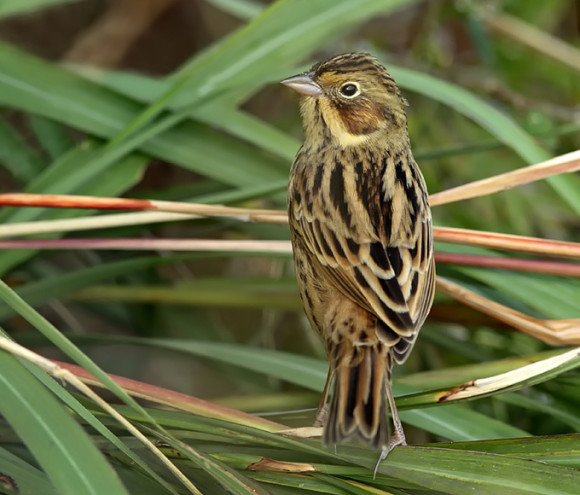Bird News from Robin Newlin
21st
From the ferry (intermittent outside access) a few Streaked Shearwaters. On the island, little evidence of incoming or newly-arrived birds. Two Bull-headed Shrikes. Several Stejneger’s Stonechats. Three Black-browed Reed Warblers. Seven White-cheeked and one Common Starling. Five Japanese Quails. A Japanese Sparrowhawk. A Eurasian Sparrowhawk. A Eastern Buzzard. A couple of Yellow-browed Reed Warblers. A small flock of Siskins. An even smaller group of Bramblings. Five or so Light-vented Bulbuls. A couple each of Olive-backed and Buff-bellied Pipits. A few calling Daurian Redstarts. 2-gu was almost birdless, with another two Buff-bellied Pipits and one Stejneger’s Stonechat.
 Gageo Island, © Robin Newlin
Gageo Island, © Robin Newlin
 Bull-headed Shrike Lanius bucephalus, © Robin Newlin
Bull-headed Shrike Lanius bucephalus, © Robin Newlin
 Common Starling Sturnus vulgaris, © Robin Newlin
Common Starling Sturnus vulgaris, © Robin Newlin
22nd
The next morning was warm and relatively calm. Winds from the East-Northeast. New birds or new numbers follow. A Long-tailed Shrike near the bamboo slope west of the village. Small numbers of Chestnut, Chestnut-eared, Black-faced, Little, Rustic and Yellow-throated Buntings. Two Greater Short-toed Larks. Four Oriental Honey Buzzards. A Peregrine Falcon. Several White Wagtails (one a rather interesting “black-backed” type) and a Grey Wagtail. Eight Japanese White-eyes. A Great Tit.
 Chestnut-eared Bunting Emberiza fucata, © Robin Newlin
Chestnut-eared Bunting Emberiza fucata, © Robin Newlin
 Black-faced Bunting Emberiza spodocephala, © Robin Newlin
Black-faced Bunting Emberiza spodocephala, © Robin Newlin
 Black-faced Bunting Emberiza spodocephala, © Robin Newlin
Black-faced Bunting Emberiza spodocephala, © Robin Newlin
23rd
Increasing wind, still apparently from Northeast A Goshawk. Three or four (mostly heard) Dusky Warblers. Ominously, perhaps, 2 Magpies. A probable (on call) overhead Blyth’s Pipit.
24th
Very high winds, making viewing difficult. One Black Kite. A pair of Chinese Penduline Tits.
 Gageo Island, early morning, © Robin Newlin
Gageo Island, early morning, © Robin Newlin25th
High winds continue unabated. Some broken trees! Several Eurasian Skylarks. A Greenfinch. A Goldcrest.
26th
Again, high winds – more gusts than steady — and no ferry. The steep and narrow path from behind the school up the mountain yielded few birds (a Goldcrest, a Bull-headed Shrike, an Oriental Honey Buzzard, some Yellow-throated Buntings) but one real surprise: an apparent hen Pheasant bursting from cover among trees near the path just beneath the crest and flying rapidly into much deeper cover. The bird did not call, and had an oddly square-looking tail. A small flock of Red-rumped Swallows overhead. A few Pale Thrushes and a group of Japanese White-eyes.
 Gageo Island, © Robin Newlin
Gageo Island, © Robin Newlin
27th
Finally winds at a reasonable clip, becoming calmer as the day continued. In the morning, a brief glimpse of a Yellow Bittern above the quarry. Three Slavonian Grebes in the harbor. On the trek to 2-gu, Pale Thrushes (some seen, most heard) one or two Dusky Thrushes (heard) and a likely Naumann’s Thrush (also heard only). Small overhead flocks of Siskins and Bramblings. An attractively chunky Peregrine patrolling the ridge. One distant calling Rubythroat. A briefly calling Taiga Flycatcher. Numbers of scolding Japanese Bush Warblers. A pair of Gageo’s distinctive (in color and call) Varied Tits. In 2-gu, another Magpie, several Japanese Bush Warblers, Stejneger’s Stonechats and a Kestrel.
 Varied Tit Poecile varius, © Robin Newlin
Varied Tit Poecile varius, © Robin Newlin
28th
Calm and hazy. No new species or markedly different numbers before the boat. No outside access on the boat and nothing tubular on the water.







